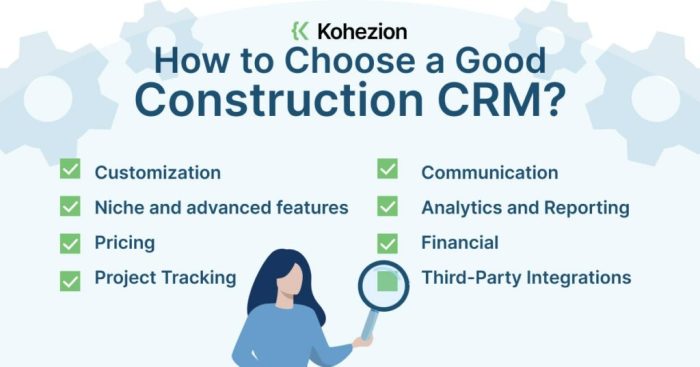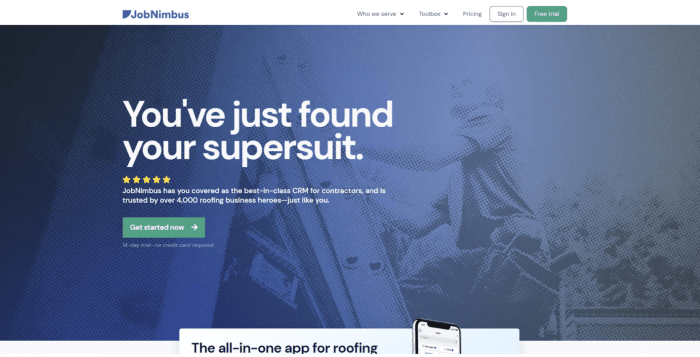Crm software for builders – The construction industry is demanding, requiring meticulous project management, efficient communication, and robust client relationships. Traditional methods often fall short in managing the complexities of multiple projects, subcontractors, and client interactions. This is where a Customer Relationship Management (CRM) system specifically designed for builders becomes invaluable. A well-implemented CRM can significantly improve efficiency, boost profitability, and foster stronger client relationships, ultimately leading to business growth.
This comprehensive guide delves into the world of CRM software for builders, exploring its features, benefits, and how to choose the right solution for your specific needs.

Source: kohezion.com
Understanding the Needs of Builders: Why CRM is Essential
Construction businesses face unique challenges that necessitate specialized CRM solutions. Unlike other industries, builders manage intricate projects with multiple moving parts, including:
- Complex Project Management: Tracking timelines, budgets, materials, and subcontractors across numerous projects simultaneously demands a robust system.
- Client Communication: Maintaining clear and consistent communication with clients, architects, and engineers is crucial for project success and client satisfaction.
- Subcontractor Management: Coordinating with various subcontractors, tracking their progress, and managing payments requires efficient organization.
- Lead Generation and Management: Identifying, qualifying, and nurturing leads is vital for sustainable business growth. A CRM helps track these leads effectively.
- Document Management: Construction projects generate a massive volume of documents. A centralized system for storing and accessing these documents is essential.
A dedicated CRM for builders addresses these challenges by providing a centralized platform to manage all aspects of the business, from initial lead generation to project completion and beyond. This integration streamlines workflows, improves communication, and ultimately boosts efficiency and profitability.
Key Features of a Builder-Focused CRM
While many generic CRM platforms exist, a CRM tailored for the construction industry offers specific features that cater to its unique needs. These include:
Project Management Capabilities:
- Detailed Project Tracking: Ability to track milestones, deadlines, budgets, and resource allocation for each project.
- Task Assignment and Management: Assign tasks to team members and subcontractors, monitor progress, and manage deadlines effectively.
- Document Management: Centralized storage and easy access to all project-related documents, including contracts, blueprints, and permits.
- Progress Reporting: Generate automated reports to track project progress and identify potential delays or issues.
Client and Communication Management:, Crm software for builders
- Contact Management: Store and manage detailed client information, including contact details, project history, and communication logs.
- Communication Tools: Integrated communication tools such as email, SMS, and even video conferencing to facilitate seamless communication.
- Client Portals: Provide clients with secure access to project information, documents, and communication updates.
- Customer Service Ticketing: Manage and track client inquiries and requests efficiently.
Subcontractor Management:
- Subcontractor Database: Maintain a database of qualified subcontractors with their contact information, expertise, and performance history.
- Payment Tracking: Track payments made to subcontractors, ensuring timely and accurate settlements.
- Performance Monitoring: Monitor the performance of subcontractors and identify any potential issues.
Lead Generation and Sales:
- Lead Capture and Qualification: Capture leads from various sources and qualify them based on predefined criteria.
- Sales Pipeline Management: Track leads through the sales pipeline, from initial contact to project completion.
- Reporting and Analytics: Generate reports to analyze sales performance and identify areas for improvement.
Choosing the Right CRM Software for Your Building Business: Crm Software For Builders
Selecting the right CRM involves careful consideration of several factors:
- Size and Complexity of Your Business: A small business may require a simpler, less expensive CRM, while a larger enterprise needs a more robust and scalable solution.
- Specific Needs and Requirements: Identify your key business needs and prioritize features that directly address those needs.
- Budget: CRM software comes in a range of prices, from affordable cloud-based options to more expensive enterprise solutions.
- Integration Capabilities: Ensure the CRM integrates seamlessly with your existing software, such as accounting software and project management tools.
- Ease of Use and User Training: Choose a CRM that is intuitive and easy to use, minimizing the need for extensive training.
- Scalability: Select a CRM that can grow with your business, accommodating increasing numbers of projects, clients, and employees.
- Customer Support: Look for a vendor that provides reliable customer support and readily available documentation.
Popular CRM Software Options for Builders
Several CRM platforms offer solutions tailored to the construction industry. Research and compare options based on your specific requirements. Some popular choices include (Note: This is not an exhaustive list, and specific features and pricing may vary):
- CoConstruct: Known for its project management features and client communication tools.
- Buildertrend: A comprehensive platform offering project management, client communication, and financial management tools.
- JobNimbus: Focuses on streamlining workflows and improving communication within construction teams.
- HubSpot CRM (with relevant integrations): While a general CRM, HubSpot can be effectively customized with relevant integrations for construction-specific needs.
- Salesforce (with relevant integrations): A highly scalable platform suitable for larger construction companies, requiring customization for optimal functionality.
Frequently Asked Questions (FAQ)
- Q: How much does CRM software for builders cost? A: Pricing varies greatly depending on the platform, features, and number of users. Expect to find options ranging from affordable monthly subscriptions to more expensive enterprise solutions.
- Q: Is CRM software difficult to learn and use? A: Many modern CRMs are designed with user-friendliness in mind. However, the learning curve may vary depending on the complexity of the software and your team’s technical proficiency.
- Q: Can a CRM improve my profitability? A: Yes, by streamlining workflows, improving efficiency, and strengthening client relationships, a well-implemented CRM can significantly contribute to increased profitability.
- Q: What are the key benefits of using a CRM in the construction industry? A: Key benefits include improved project management, enhanced client communication, better subcontractor management, increased sales efficiency, and improved overall business organization.
- Q: How do I choose the best CRM for my business? A: Consider your business size, specific needs, budget, integration requirements, ease of use, scalability, and customer support when making your selection.
Conclusion
Implementing a CRM system is a strategic investment for any construction business looking to enhance efficiency, improve client relationships, and drive profitability. By carefully evaluating your needs and selecting the right software, you can leverage the power of CRM to streamline your operations and achieve sustainable growth. Don’t let outdated methods hold your business back – explore the possibilities of a dedicated CRM for builders today!
Call to Action
Ready to transform your construction business? Contact us today for a free consultation to discuss your specific needs and find the perfect CRM solution for your company. Let’s build a better future, together!
Helpful Answers
What types of CRM software are best suited for builders?
Cloud-based CRMs offering project management capabilities and customizability are generally ideal. Look for features like task management, scheduling, and reporting functionalities tailored to the construction industry.

Source: psdcenter.com
How much does CRM software for builders typically cost?
Pricing varies greatly depending on features, number of users, and vendor. Expect to find options ranging from affordable monthly subscriptions to more enterprise-level solutions with higher costs.

Source: pipelinecrm.com
Can CRM software integrate with my existing accounting software?
Many CRMs offer integrations with popular accounting platforms. Check the software’s compatibility before purchasing to ensure a seamless workflow.
What are the key features to look for in a builder’s CRM?
Essential features include contact management, project tracking, task management, document storage, reporting, and ideally, mobile accessibility.
